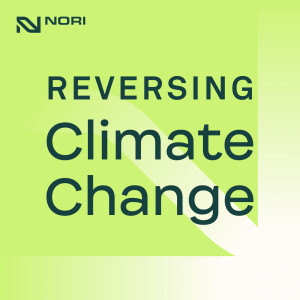
S2E8: Commoditizing Forest Carbon and Its Discontents—w/ Dr. Lauren Gifford
 2020-04-14
2020-04-14
As Samuel Johnson famously said, “Hell is paved with good intentions.” And many of the previous attempts to commodify carbon, in forests for instance, excluded the very people who were impacted most and led to a number of unintended consequences. So, how can Nori create a market that quantifies carbon removal—without making those same mistakes?
Dr. Lauren Gifford is a critical geographer exploring the intersections of global climate policy, conservation, markets and justice. She is also the host of Carbon Social Club and the author of a recent paper entitled “‘You Can’t Value What You Can’t Measure’: A Critical Look at Forest Carbon Accounting.” On this episode, we dig into avoided deforestation credits, REDD/REDD+, and the dynamics at play when carbon is commoditized in forestry and in general.
Lauren describes the carbon colonialism charge that is often levied against early iterations of REDD, explaining why the Global North’s investment in saving high-density tropical rainforests failed, how the money was actually spent, and what unintended consequences emerged around these carbon offset projects. Listen in for Lauren’s insight on the danger in financializing a forest and learn how Nori is considering issues of equity and justice as we work to standardize an efficient way of quantifying carbon.
Key Takeaways
[2:34] Lauren’s work around the commodification of carbon
10 years looking at forest carbon assets Consider who’s included + excluded
[4:59] The origin of carbon credits for forestry
REDD introduced at UNFCCC 2007 Paid forest stewards not to cut down trees
[7:18] What happened to the money invested to save the rainforest
$4M invested in project in NC Peru $100K to $300K for people doing conservation work Rest spent on bureaucracies (make forest carbon legible in markets)
[11:44] The driving question behind Lauren’s doctoral research
What is a forest carbon offset? Means something different to every player along pipeline
[13:42] Lauren’s insight on carbon colonialism
Unintended consequences, justice implications of development Top-down environmental governance (how dominant community wants managed)
[18:19] The danger in financializing forests
Seen as financial entity, overlooks biodiversity/habitat Becomes dominant way of understanding space
[23:42] Donating to soil carbon projects vs. creating complex markets
Both good ways to remove carbon from atmosphere Nori looking to standardize efficient way to quantify
[27:59] Lauren’s take on why we’d be better off without REDD+
Very colonial from beginning (Global North pay off ecological guilt) Tumultuous land tenure, can’t prevent deforestation in weak states
[32:13] How the terms baseline and additionality are defined
Baseline = business-as-usual scenario (defined by own parameters) Additionality = carbon sequestration beyond baseline
[38:33] Nori’s intention to avoid the criticisms of previous carbon markets
Relationship between environment + finance = hotly contested Carefully consider unintended consequences, who’s left out
[41:54] How Nori thinks about the loss of small farms in the US
Farmers empowered to get together in cooperatives Make easy to play part in market (but not ‘savior’)
[44:16] What equity and justice mean to the Nori team
Can’t serve intended communities without those core values Build equitable talent funnel for diversity of perspective
Connect with Ross & Christophe
Nori
Nori on Facebook
Nori on Twitter
Nori on Medium
Nori on YouTube
Nori on GitHub
Nori on Patreon
Nori Newsletter
Email podcast@nori.com
Nori White Paper
Subscribe on iTunes
Carbon Removal Newsroom
Resources
Lauren’s Academic Website
Carbon Social Club
“‘You Can’t Value What You Can’t Measure’: A Critical Look at Forest Carbon Accounting” in Climatic Change
United Nations Framework Convention on Climate Change
Jerome Whitington
The Carbon Rush: The Truth Behind the Carbon Market Smokescreen by Amy Miller
Patrick Bond
What Money Can’t Buy: The Moral Limits of Markets by Michael J. Sandel
Kelly Kay’s Research Works
Wendell Berry
ISO Guidelines on Greenhouse Gas Accounting & Verification
Lisa Song’s REDD Feature in ProPublica
Dr. Jane Zelikova on RCC S2 EP07
More Episodes
Create your
podcast in
minutes
- Full-featured podcast site
- Unlimited storage and bandwidth
- Comprehensive podcast stats
- Distribute to Apple Podcasts, Spotify, and more
- Make money with your podcast
It is Free
- Privacy Policy
- Cookie Policy
- Terms of Use
- Consent Preferences
- Copyright © 2015-2024 Podbean.com






